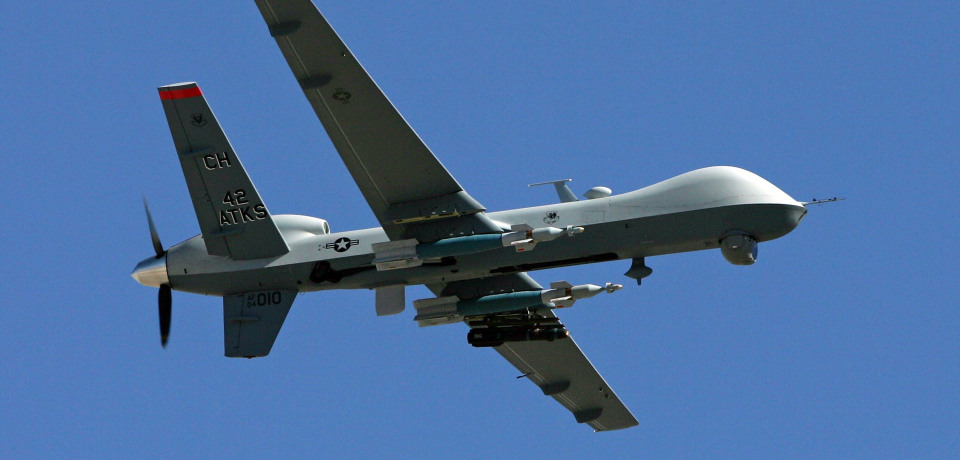PBS: Escaping Eritrea … [Read More...] about ካብ ውሽጢ ቤት ማእሰርታት ኤርትራ
The United States is pulling the plug on its drone operations in southern Ethiopia as demands on its fleet of unmanned aircraft expand elsewhere across the continent with the rise of the Islamic State in Libya, and extremist militants in Nigeria, Mali, Chad and Cameroon.
Since 2011, the U.S. had been using the air base in Arba Minch, 250 miles south of the capital, to launch surveillance drones aimed at groups in East Africa with links to al Qaeda. U.S. personnel primarily focused on al-Shabab, a Somali group which has waged deadly terrorist attacks across East Africa.
Pentagon officials remained tightlipped on Monday about the reasons behind the move. Lt. Col. Michelle Baldanza, a Defense Department spokeswoman, said the U.S. and Ethiopia agreed that the continued presence of the drone base was “not required at this time.”

Some experts say the fight against Shabab was going well enough that the Pentagon’s Africa Command, or Africom, had the opportunity to redistribute its scarce resources elsewhere.
“Shabab remains virulent, but as a significant terrorist threat with high profile leaders in range for drone attacks, much less so,” said Peter Pham, director of the Atlantic Council’s Africa Center.
Other groups, by contrast, are rapidly gaining strength — and presenting far more tempting targets for the Pentagon and its drone operators.
In recent months, the Islamic State has consolidated its power in Libya, allowing it to easily move into the port city of Surt, and now control an estimated 150 miles of territory along the country’s Mediterranean coast. Its presence has reportedly forced the U.S. to focus on gathering intelligence there in order to better monitor militant movements in North Africa.
The continued strength of Boko Haram — the extremist group terrorizing northeastern Nigeria and parts of Cameroon, Chad, and Niger — has also forced Washington to dedicate more resources in the Lake Chad region as well. Since 2009, Boko Haram has killed more than 10,000 people and by last year the group controlled an area the size of Belgium. After the militants were forced out of some of their Nigerian strongholds by a multinational African task force last spring, they switched to more asymmetrical tactics and increased suicide bombings and cross border raids. In September, President Barack Obama pledged $45 million to help countries in the Lake Chad region beat back the group. And in October, the U.S. sent a fleet of surveillance drones and 300 troops to Cameroon.
Those pressures have forced Africom to reevaluate where it allocates resources, say experts.
“Africom remains under-resourced and our entire drone program, although it’s grown tremendously over the years, is facing a wide array of demands,” said Pham.
Jennifer Cooke, director of the Africa program at the Center for Strategic and International Studies in Washington, said that the U.S. military is likely facing pressure to tackle other African threats, and is trying to consolidate its bases in the region.
“It may be that with a base in Djibouti there’s just not the need for as many positions in East Africa as before,” she said.
In 2014, the Pentagon attempted to lower the number of combat air patrols flown by Air Force drone pilots to 55 per day to ease the strain on pilots as the U.S. withdrew from its mission in Afghanistan. But 2015 brought the rise of the Islamic State and a Taliban resurgence, forcing the U.S. to order daily intelligence, surveillance and reconnaissance missions over Iraq, Syria, and elsewhere.
But moving drones and drone operators out of Ethiopia doesn’t come without a cost.
According to a congressional aide, it will put significantly more demands on the U.S. drone base in Djibouti, which operates under fewer restrictions and functions as America’s main combat hub for counterterrorism efforts in the Middle East and the Horn of Africa. If the U.S. were to ever lose access to that base, it would risk flying blind in a region of increasing strategic importance.
Although State Department officials maintained that the move had nothing to do with bilateral differences between the U.S. and Ethiopia, some experts speculated that Addis Ababa may have had reservations about hosting the U.S. drones.
Terrence Lyons, a regional expert and associate professor at George Mason University, told FP that the base’s closure could signal “the U.S. is having difficulties with its relationship with Ethiopia.”
Ethiopia’s authoritarian ruling government won nearly 100 percent of the national vote in May and has come under fire from human rights organizations that claim it has unfairly cracked down on journalists and activists. Domestically, the ruling party has also had to face some unrest in the Muslim community, where many believe the government has overstepped its boundaries and interfered with the country’s official Islamic authority.
“It could be that from the Ethiopian government side, being seen as one of the countries supporting drone bases killing Muslims in the region might have been problematic,” Lyons said.
State Department spokeswoman Victoria O’Connell denied that bilateral tensions were involved in the decision and said it was “based on Africom’s assessment of the situation and the usefulness” of the base.
